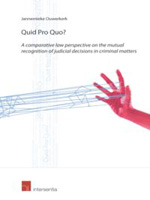Quid pro quo?
a comparative Law perspective on the mutual recognition of judicial decisions in criminal matters
- ISBN: 9789400001763
- Editorial: Intersentia Ltd.
- Fecha de la edición: 2011
- Lugar de la edición: Antwerp. Bélgica
- Encuadernación: Rústica
- Medidas: 23 cm
- Nº Pág.: 318
- Idiomas: Inglés

Within the framework of judicial cooperation between the 27 Member States of the European Union, mutual recognition is a leading principle: it basically requires that judgments and other judicial decisions handed down by a criminal judge in any Member State must be given legal force in any other Member State. In its pure form, the principle of mutual recognition is primarily characterised by direct contact between judicial rather than political organs; the removal of grounds to refuse the acceptance and enforcement of foreign decisions; the abolishment of the principle of double criminality; the end of the exequatur procedure; and strict and fixed deadlines as well as standard forms to be used by the judicial authorities. The idea of mutual recognition in its pure form gives rise to several fundamental questions, mainly related to the absence of a clear definition of mutual recognition as well as to its application in practice. This book provides a comparative law perspective on the mutual recognition of judicial decisions in criminal matters. With the aim of creating a clear definition of mutual recognition in the context of criminal law, an internal comparison is made with mutual recognition in other fields of EU competence: the internal market and the field of civil and commercial law. Furthermore, proceeding from the hypothesis that the experience built up in federal countries contains lessons for the future of mutual recognition in the European Union, an external comparison is made with the federations of Switzerland and the United States of America. This book examines the approach of both federations towards accepting and enforcing judicial decisions in criminal affairs handed down in another jurisdiction.






